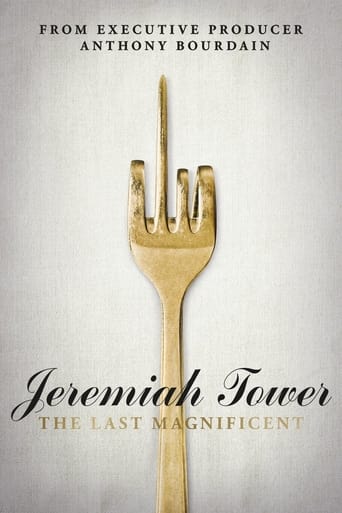bobspez
The story relates that Jeremiah studied Architecture at Harvard until he was 30 and then was supposedly cut off financially by his family. There is no information at all about his parents or family, except they were wealthy and often traveled first class around the world with Tower in tow, but left to his own devices. Wikipedia states his father was a managing director for a film sound company, and that Jeremiah went to school in Australia, Connecticut, England, and at Harvard, and that when Jeremiah's grandfather died, Jeremiah was cut off financially. The film gives us Tower as a person emerging without family or connections at the age of 30, moving to California and getting a job at Chez Panisse in Berkeley. The film jumps from Jeremiah leaving Chez Panisse and starting up the fabulously successful Stars Restaurant in San Francisco. According to Wiki, after leaving Chez Panisse he spent the next 6 years working at various restaurants in the Bay area."He worked at the Ventana Inn at Big Sur beginning 1978, taught briefly at the California Culinary Academy, and revived the dying Balboa Cafe in San Francisco in 1981. In 1982, he became head chef and co-owner at Berkeley's Santa Fe Bar and Grill. In 1984 Tower opened Stars Restaurant, his passion and greatest success.According to wiki Tower also "opened branches of Stars restaurant in Oakville (Napa Valley), Palo Alto, Manila, and Singapore." He was also busy with a number of other ventures according to wiki including "the Peak Cafe in Hong Kong in the 1990s, as well as various related ventures in San Francisco including a more casual cafe, an upscale bistro, and a kitchenware shop, and celebrity endorsement contracts, including one for Dewar's Scotch. In 1998, Tower sold a part interest in the Stars restaurants to a Singapore real estate company, but the new owners closed the restaurant in 1999.The film tries to give the impression that Tower was a man of mystery who disappeared from the world after leaving Stars for unknown reasons. But it is more likely his multiple ventures were ultimately financially unsustainable. Wiki also has some information on his whereabouts during his years out of the spotlight. "Tower moved to Manila for a year, then to New York City for four years, then Italy and Mexico. In 2014, he was hired as executive chef of Tavern on the Green in New York City, but he left in April 2015, after six months."The thing that I get from this movie is there were a lot of holes in the story. In many ways I get the impression that Tower manufactured much of his own history, or lack of it. Apparently he was a motivated and talented chef, but overextended himself in business and wound up being able to pack up all his possessions in 4 hours and place them in two bags in a pickup truck.While the film seems like an interesting love letter to Tower from Bourdain, it just reeks of BS to me. It portrays him as a sort of Great Gatsby, a man of wealth and taste and mystery. In fact he lived a life of great pretense, success and failure. The most honest moment in the movie seems to be when he says at the end, I'm writing a book, about how to be a well mannered idiot.
Paul Allaer
"Jeremiah Tower: The Last Magnificent" (2016 release; 103 min.) i a documentary about the celebrity chef Jeremiah Tower. The documentary opens with a quote of his: "I have to stay away from human, because somehow I am not one myself", as we see Tower walking around historic Mexican ruins. After a brief introduction as to his peak achievements (Chez Panisse in the 70s; Stars in the 80s), we then go back in time as Tower himself narrates and muses about his upbringing (including his complicated relationship with his parents) and how he came to love food and cooking (showing both archival 8mm footage and re-enactments).Couple of comments: this is the directorial debut from TV personality (and chef himself) Anthony Bourdain. Here he tackles a subject matter that I assume is near and dear to his heart, or at least one that he i thoroughly familiar with. Let me admit upfront that I had never heard of Jeremiah Tower before seeing this (I am not really a foodie). It is quite interesting to see how Tower, with no formal cooking schooling whatsoever) rise in the world of restaurants, eventually becoming a "brand" himself and perhaps one of the first celebrity chefs as we know that term today, "Tower is like a conductor of an orchestra" comments one of the (many) talking heads in the movie. At a certain point, Tower retires from the restaurant business for 15 years (so we are told in the documentary), leaving nary a trail as to what he's up to, only to come out of retirement to become the chef at Tavern on the Green in New York in late 2014. At that point, the movie bring some tension as we don't know how all that will play out (just watch!). I couldn't help but notice that the documentary skips entirely what Tower does in the 90s after Stars and before retiring for 15 years."Jeremiah Tower: The Last Magnificent" opened this weekend at my local art-house theater here in Cincinnati. The Sunday evening screening where I saw this at was attended poorly (5 people in total, including myself). I enjoyed the documentary for what it was, but must say that it isn't up to the level of various other documentaries that leave you astonished (such as the recent "God Knows Where I am", just to name that one). But if you are a foodie, you will definitely want to check this out, be it in the theater, on Amazon Instant Video, or eventually on DVD/Blu-ray.
marsanobill
Jeremiah Tower: The Last Magnificent is part-biography, part revenge and, as one semi-literate critic for a men's clothing magazine put it, 'so fun.' Well, let's say absorbing and enjoyable. Tower grew up luxe under hands-off parents who took him on glamorous travels but usually left him to his own devices, like luggage tagged 'not wanted on the voyage.' And so young Jeremiah began developing a personal esthetic derived from the ocean liners and grand hotels he eagerly explored—their kitchens especially. He perhaps more than Alice Waters put her Chez Panisse on the map and she returned the favor by copying his menus and recipes in her cookbook while giving him no credit at all and only a perfunctory word of thanks. Tower moved on to Stars, his stunning max-luxe celebrity restaurant in San Francisco, then, post-recession, vanished for 15 years until he made the terrible mistake of signing on as Tavern on the Green's second top chef in five months. Bankrupt in 2009, the New York landmark, its gaudiest trap for tourists and suburban wedding planners, had reopened in 2014 under two guys from Philadelphia (!!!). Their expertise came from a crepe restaurant and a lounge noted mostly for its dance floor. (Tower, who split after six months, says they asked him whether lamb had both white and dark meat. As the Philly wonder twins would be on their fourth chef by 2016, I can imagine them ordering sushi medium-rare.) Plenty of top foodies appear in support of Tower: Ruth Reichl, Mario Batali, Wolfgang Puck, Martha Stewart and co-producer Anthony Bourdain proclaim him and unrecognized culinary giant, and he himself is a compelling presence. In all a documentary that's good to look at, fascinating in its insider view, and both beguiling and melancholy.
David Ferguson
Greetings again from the darkness. Maybe the line between megalomania and genius doesn't exist, or a more likely explanation has the two as mutually exclusive. Director Lydia Tenaglia (an Emmy winner) tackles the profile of ultra-fascinating Jeremiah Tower, one of, if not the first U.S. celebrity chef. Her approach seems to carom between idol worship, psychoanalysis and mythology, often creating a rudderless feeling for viewers – viewers who remain captivated by the man and the story.Mr. Tower performs voice-over during much of the segment on his childhood, and one of his first lines, "I have to stay away from human beings because somehow I'm not one", sets the stage for a childhood that explains much. His wealthy parents took a hands-off approach, though young Jeremiah (when not in elite boarding school) often accompanied them on international travels, luxurious Ocean cruises (including the Queen Mary), and first class resorts and hotels. The solitude of these trips invariably found the young boy in the kitchen with food, his favorite travel companion. An evening on a beach with a stranger who is grilling a barracuda provides a particularly harrowing memory, and clearly helps us understand how that 6 year old grew to be an adult who never found a humanistic rhythm with others.Anthony Bourdain is a producer on the film and also provides commentary throughout. He states "We should know who changed the world". Specifically he is referring to the pioneers of food, and he puts Jeremiah Tower as high on the pedestal as any. Bourdain, other chefs, Tower's Harvard friends, and even food critics chime in on the impact of Tower joining Alice Waters at her Berkeley Chez Panisse in 1972. The idealism of the times and the people created a cultural clash that resulted in what Martha Stewart termed New American cuisine, or perhaps more accurately, California cuisine. Some terrific photos and clips of those early days really add an element of depth to an era which is typically lacking in such documentation.After the split between Ms. Waters and Mr. Tower, his explosion into the global food world occurred with his Stars restaurant in San Francisco in the mid-1980's. This seemed to be the meld of Tower's personality, his creative menu ideas, and his quest for the perfect eating establishment, and soon became known worldwide as a must-visit for traveling foodies.It's at this point where the timeline becomes muddled – seemingly on purpose by the filmmaker - in an effort to add mystery to what otherwise would be expected erratic behavior from an artist who just can't be satisfied. Tower's self-imposed exile leaves his friends befuddled, and we get interspersed shots of him climbing pyramids and cooking in his Merida apartment. Philosophical meanderings are used to fill the gaps. "What are my great expectations?" How could such a genius be expected to live with "the horror of mediocrity"? On more than one occasion, we hear Tower's life philosophy stated as "I long for the crown, but know the guillotine is close". This would all seem overly dramatic if it didn't so perfectly fit the profile of the man.The incomprehensible "comeback" at NYC's Tavern on the Green after 15 years away, does allow us to more closely view his endless pursuit of perfection, and the price paid for a life of loneliness and ego. True innovators and true genius are often painful to look at once the curtain is pulled back.






